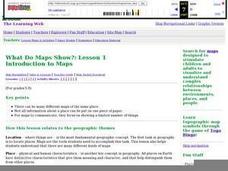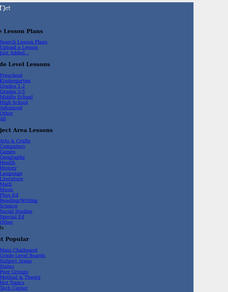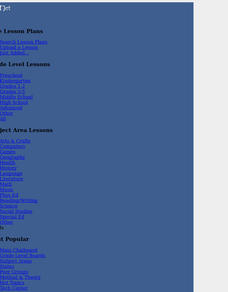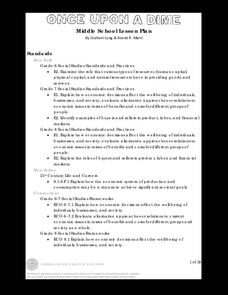Facing History and Ourselves
Blending In and Standing Out
An excerpt from Sarfraz Manzoor's memoir about how his experiences as a Pakistani growing up in England shaped the way he though about his identify provides a stimulus for a discussion of how experiences can shape our concept of identity...
Curated OER
What Do Maps Show?: Lesson 1 Introduction to Maps
Students brainstorm a list of the different types of maps they have seen or used. Using the activity sheet, they look through a social studies book to find all the maps and to determine what they are used for. Using a poster, they review...
Curated OER
Anasazi Basket Weaving
The Anasazi Indians of Mesa Verde are the focus of this art and social studies activity. Working in pairs or groups of three, students utilize computers and go online to search for websites about the Anasazi. Students will choose two or...
Brain Scape
Learn About Religions
Buddhism, Christianity, Hinduism, Islam, Judaism, Taoism. The major religions of the world are the focus of a resource that uses flashcard decks to engage users in a study of the principles and practices of these belief systems.
Curated OER
First Amendment Guarantee of Free Speech (Senior, Social Studies)
Students receive a list of banned books from which they choose one to read. They read their chosen book and write a paper that includes a discussion of the First Amendment and its guarantees and the reason(s) why they believe their book...
Curated OER
Social Studies: The Birth of Olympism
Students complete maps of Ancient Greece identifying key sites of the ancient Olympic games. After watching a video, they complete worksheets about the games and the athletes. Students discuss how the spirit of Ekecheiria, the "Sacred...
Curated OER
Creating a Database: Africa, Technology, Social Studies
Students use technology to create a database demonstrating their knowlede (in the case) of the African Continent. This project could be applied to almost any other concept studied.
Curated OER
The Future of Social Studies Education
Students work in groups of four and complete a roster of their names and personal information and to complete a release form that allows their pictures to be placed online. They then engage in classroom activities while being...
Curated OER
Houghton Mifflin Social Studies/ Chapter 5, Lesson 2: Mexico Defeated (pp. 116-120)
Third graders study how the United States declared war on Mexico and succeeded in gaining control of California. Several activities are included in the lesson. The lesson outline is included as a link.
Curated OER
Houghton Mifflin Social Studies/Chapter 8, Lesson 1: Farming Takes Hold (pp. 184-187)
Fourth graders discuss that the movement toward farming during the 1850's to the 1870's meant for California. The economy of California is studied in relationship to the effects of farming. There are several focus questions to help...
Curated OER
Spirit Mask Ashira/Bapunu, Ogowe River, Gabon
Explore the concept of beauty as it has been seen through the eyes of various African tribal groups. Learners create masks of beauty as they see it, taking the African concept of inner beauty into consideration. This instructional...
EduGAINs
Governmental Apology for the Aboriginal Experience—Canadian and World Studies
What constitutes an effective apology? After considering a series of scenarios, class members develop criteria for an effective apology and then use these indicators to evaluate Canada's Prime Minister Harper's apology to former...
US Institute of Peace
Perspectives on Peace
Is peace simply the absence of war, or is there more to the story? Young social scientists define peace in the second installment of a 15-part series. Groups work together to explore cultural concepts of peace and the peacemaking process...
College Board
2018 AP® Microeconomics Free-Response Questions
How much should Nirali study for her history and economics exams if she has a limited amount of time for both? Scholars consider opportunity cost in using this real-world scenario from College Board. Other questions include looking at a...
Council for Economic Education
Loan Amortization - Mortgage
When you buy a home for $100,000, you pay $100,000—right? On the list of important things for individuals to understand, the lesson presents the concept of interest rates and loan amortization using spreadsheets and online sources....
PBS
The Supreme Court: Civil Rights and Civil Liberties
While World War II changed the international order, it also led to a fundamental shift in the concept of civil rights within the United States. Using a video and discussion questions, class members consider the effects the war had to the...
Middle Level Learning
Philip Reid and the Statue of Freedom
Approach the concept of freedom in United States history from a variety of angles and delve into rich primary source analysis practice. Pupils study the Statue of Freedom, which sits atop the dome of the Capitol building in...
Curated OER
Cartoons for the Classroom: College as Concept
In this current events worksheet, learners analyze a political cartoon about the college application process and respond to 3 talking point questions.
Carolina K-12
Sample Test: Economics
From scarcity and marginal benefits and costs to economic systems and GDP, this 22-question multiple choice test covers some of the most fundamental concepts of economics.
iCivics
Mini-Lesson: Gerrymandering
Who determines the structure of voting districts? The concept of gerrymandering brings to light the ongoing issue of how those running for office gain votes. Hands-on activities enable scholars to analyze the re-drawing of voting...
iCivics
Mini-Lesson: The Incumbent Advantage
Does the person running for re-election have an advantage over the challenger? Scholars explore the concept of incumbent advantage during elections using an informative mini-lesson explaining the legislative branch. In pairs, they...
Council for Economic Education
Inflation Data: Is the Economy Healthy?
What stories do current trends tell about society, fashion, and the future? Scholars investigate the concept of inflation and its impact on the future of the American economy. They compile current economic data to determine the level of...
Federal Reserve Bank
Once Upon a Dime: Middle School Lesson Plan
Once Upon a Dime ... a group of middle schoolers wanted to learn about economics! Teach them complex economic concepts like supply and demand through a resource that effectively simplifies the explanations. Pupils work through various...
iCivics
County Basics
To understand the concept of a county government system, scholars read a short passage, view a helpful visual aid, use the web to conduct some research about their local areas, and then answer related questions online.

























